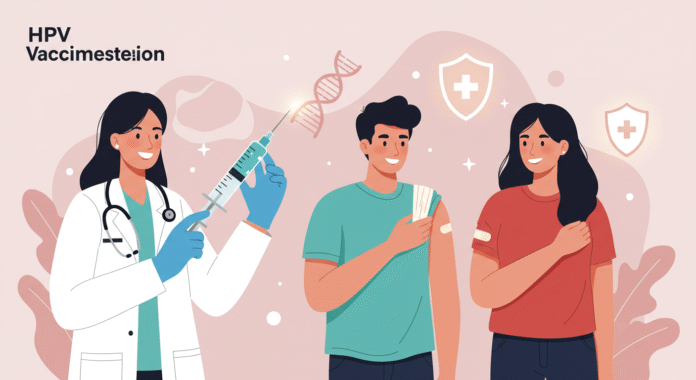Introduction
Pakistan’s Historic HPV Vaccination Campaign, launched in September 2025, is a groundbreaking public health initiative that aims to protect millions of girls aged 9 to 14 against cervical cancer. By introducing a scientifically proven HPV vaccine nationwide, Pakistan has taken a major step forward in women’s health and aligned with the global WHO strategy to eliminate cervical cancer by 2030.
Why Pakistan’s Historic HPV Vaccination Campaign Matters
Cervical Cancer in Pakistan
Cervical cancer is the third most common cancer among Pakistani women, with around 5,000 new cases and 3,000 deaths reported annually.
Due to limited awareness, low screening rates, and the absence of a national cancer registry, the actual numbers may be much higher.
The Role of HPV in Cervical Cancer
The human papillomavirus (HPV) is the primary cause of cervical cancer.
Unfortunately, awareness about HPV in Pakistan is extremely low — only 5% of caregivers know about HPV, and just 2% understand that vaccination can prevent cervical cancer. This makes Pakistan’s Historic HPV Vaccination Campaign critical for saving lives.
Scale and Strategy of the Campaign
Phase One: September 2025
From September 15 to 27, 2025, the campaign targeted 13 million girls aged 9–14 across Punjab, Sindh, Azad Jammu and Kashmir, and Islamabad.
Vaccines were delivered through schools, health centers, outreach programs, and mobile teams to ensure wide coverage, including out-of-school girls.
Expansion Plan
- 2026: Khyber Pakhtunkhwa (3.2 million girls)
- 2027: Balochistan & Gilgit-Baltistan (1.4 million girls)
This phased rollout allows better monitoring, adaptation, and community engagement.
Training and Support Behind the Campaign
Backed by WHO, almost 49,000 vaccinators, social mobilizers, doctors, and data operators were trained to ensure the vaccine is delivered safely. Training included:
- Proper vaccine administration
- Community engagement to build trust
- Data tracking for effectiveness
Such massive training efforts strengthen the credibility of Pakistan’s Historic HPV Vaccination Campaign.
Vaccine Schedule and Safety
Following WHO guidelines, the HPV vaccine is given as a single dose for girls aged 9–14, making it easier to reach millions quickly.
Pakistan uses WHO-approved vaccines like Gardasil (quadrivalent) and bivalent options that protect against the most dangerous HPV strains.
The vaccine is:
- Safe and scientifically tested
- Effective in preventing cervical cancer
- Free of cost under Pakistan’s immunization program
Overcoming Challenges
Combating Misinformation
One of the biggest barriers to Pakistan’s Historic HPV Vaccination Campaign is vaccine hesitancy fueled by myths.
Many caregivers wrongly believe cervical cancer comes from poor hygiene or is curable with simple medicines.
Reaching Vulnerable Girls
Girls outside the school system, especially those in marginalized, flood-hit, or nomadic communities, remain at higher risk of being missed. Mobile teams are crucial to filling this gap.
Building Public Trust
To encourage acceptance, health leaders, including officials from the Ministry of Health, have openly supported the campaign, with some even vaccinating their own daughters.
Partnerships and Future Plans
The campaign is supported by:
- Government of Pakistan
- WHO
- GAVI (The Vaccine Alliance)
- National & international health organizations
The long-term goal is to integrate HPV vaccination into Pakistan’s routine immunization program, ensuring that future generations of girls remain protected.
Pakistan’s Historic HPV Vaccination Campaign represents a turning point for women’s health in the country.
By aiming to vaccinate 13 million girls in 2025 and millions more in coming years, Pakistan is working toward the WHO vision of eliminating cervical cancer by 2030.
This campaign is not just about vaccines — it’s about saving lives, empowering women, and prioritizing public health for future generations.



